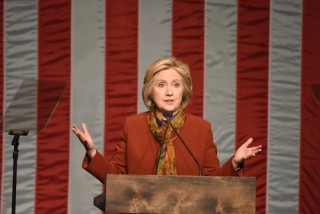
The four possibilities are:
Before the primaries end. If Clinton were to be indicted before the end of primary season, we’d likely see her engage in a game of political chicken. Because an indictment (and frankly, even a conviction) wouldn’t automatically disqualify her from continuing to seek election, Clinton would probably stay in the race until the consequences of any criminal charges became clearer. If she felt that a looming prosecution necessitated her withdrawal from the race, Clinton could take herself off the primary ballot; this would allow her delegates the freedom to support a candidate of their choosing. Bernie Sanders would likely remain on the primary ballots for the states yet to conduct their primaries, and he would try to persuade as many former Hillary delegates to support him. Once everyone arrived at the Democratic National Convention (DNC), though, other candidates would join the fray and delegates would scatter in every direction.
After the primaries end, but before the convention. If the Democratic party were to arrive at the DNC in the unprecedented position of having enough pledged delegates to nominate Hillary Clinton, but with no Hillary Clinton available for them to nominate, the convention would become “brokered.” Cue Elizabeth Warren, Andrew Cuomo, Joe Biden, and John Kerry. President Obama would probably issue some sort of call-to-action on behalf of the Democratic Party, and after much frenzy and fanfare, we’d get a new Democratic nominee. That person, by virtue purely of the fact that he or she is neither Hillary Clinton nor Donald Trump, would probably emerge as a quick crowd favorite, become the next president, and pardon Hillary Clinton before even entering the Oval Office.
After the convention, but before the election. If Clinton were to become the Democratic nominee only then to find that an indictment threatened her short road to the White House, the outcome would be largely the same as it would be in the above scenario. She would likely drop out of the race, which would cause an immediate vacancy on the Democratic ticket. The difference in this scenario, though, would be that after the Convention, Clinton would have already declared a running mate. That person might slip effortlessly into Clinton’s shoes – or might face some sort of compressed convention-type process. Of course, there’s also the possibility that the Secretary would boldly test the loyalty of her supporters and continue her run; such a move would be risky, but given recent polling, still might work to elect the next President Clinton.
After the election. If Clinton were to dazzle enough voters (conversely, if Trump were to sicken enough voters) to be elected, and then face a presidential-term indictment, she will likely ride the same wave her husband did. Hillary Clinton would take office, defend any indictment, and deal with the resulting fallout. That fallout would almost surely mean impeachment (although, not necessarily conviction), as it did for Bill Clinton. However, given that neither an indictment nor an impeachment guarantees any particular outcome, it’s entirely possible that a Madam President Clinton could continue on as the 45th President of the United States, leaving Emailgate as a historical footnote.
From my reading of the relevant statutes, an indictment against Secretary Clinton is possible, but hasn’t yet reached the level of “likely.” In any criminal prosecution, the misdeed is only half the equation; proof of the required mental state or standard of care is necessary for any conviction. In a case like this one, it wouldn’t be difficult to imagine a scenario in which the evidence is sufficient to show that Clinton did something wrong, but insufficient to prove that she did it purposely, knowingly, or recklessly.
Furthermore, while there’s no direct precedent governing the scenario of a FLOTUS-turned-Secretary being prosecuted for mishandling state secrets, presidents have gone on to serve after brushing with the law. President George W. Bush had been arrested in 1976 for drunk driving – a secret which failed to derail his presidency even when it was sprung on the country right before Election Day. And of course, President Clinton’s now-famous perjury charges may have tarnished his public image, but failed to truly impact his presidency.
The Constitution is clear about the necessary qualifications for this position: the president must be above the age of thirty-five, have lived in the United States for at least fourteen years, and be a “natural-born citizen.” Placing further restrictions on the office cannot be done without passing a Constitutional amendment — a change I’ve never heard anyone even suggest. It’s fascinating that the drafters of our Constitution put more emphasis on a person’s birthplace than on that person’s actions — but then, they were politicians too. Maybe their choice not to require our nation’s leader to be strictly law-abiding was not an oversight, but rather, a deliberate omission by those who understood the use of criminal prosecution as a political tool.